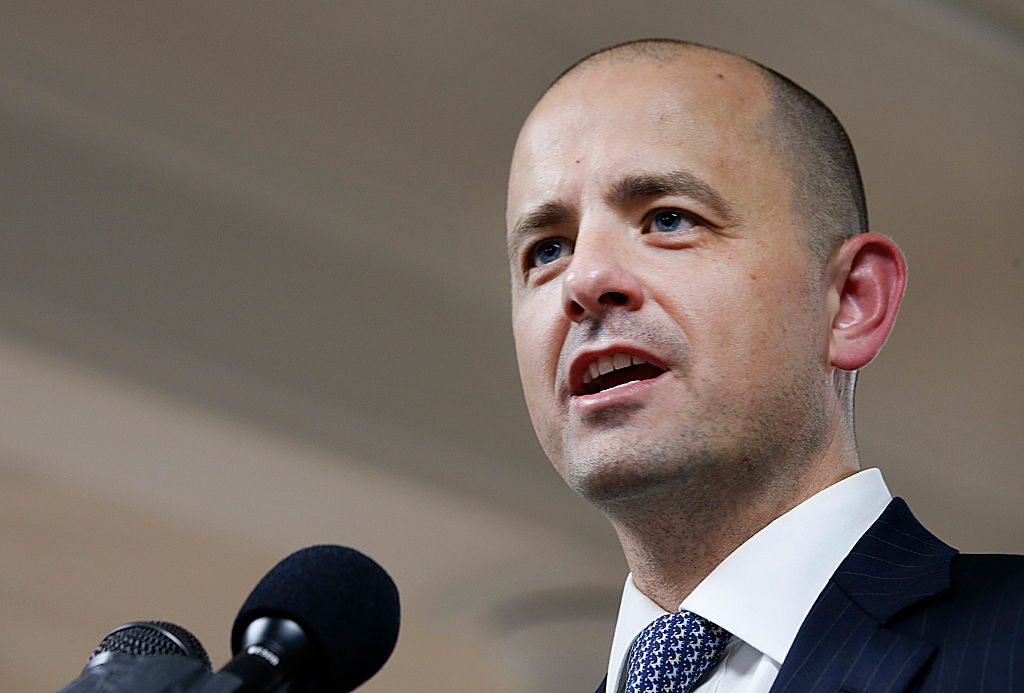Red Rhode Island
Republicans are feeling bullish even in the bluest places. Just look at Rhode Island. Democrats have controlled the 2nd Congressional District for 30 years. Biden won the district by roughly 14 points in 2020. So why do Cook Political Report and Sabato’s Crystal Ball say the race is a tossup?
Meet Allan Fung, the former mayor of Cranston who ran unsuccessfully for governor of Rhode Island in 2014 and 2018. Election analysts say Fung’s centrist platform makes him a strong candidate for the open seat—and he’s up by 8 points in a recent poll. Fung has also locked in financial support from the Kevin McCarthy-aligned Congressional Leadership Fund. Chris Christie just finished a campaign swing through the district to tout Fung’s record.
Fung says Democrats have struggled to tie him to the rest of the GOP. “Whether it’s abortion, guns, economy, everything, I don’t fit their narrative,” Fung recently told Politico.
Of course, Rhode Island isn’t the only blue spot that could turn red. Republicans are drooling over the prospect of unseating Democratic Congressional Campaign Committee chair Sean Patrick Maloney in New York. But more on this ongoing saga next week …
McConnell’s New Hampshire Primary Mystery: Solved
In the weeks leading up to New Hampshire’s September 13 Senate primary, Republican Chuck Morse got a mysterious gift: $6.8 million in advertising support from a pop-up super PAC.
Thanks to third quarter Federal Election Commission reports, we now know that a huge slice of that advertising money—$4.8 million, to be exact—came from the Mitch McConnell-aligned Senate Leadership Fund.
The big reveal has put McConnell in a sticky situation with the GOP nominee, retired Army Gen. Don Bolduc. No surprise then that SLF has since booked $23 million in ad buys in support of Bolduc in his bid to oust Democratic Sen. Maggie Hassan.
Utah Democrats Start Seeing a Payoff In Evan McMullin
GOP Sen. Mitt Romney has remained neutral in this year’s U.S. Senate race in his home state of Utah, where two-term Republican Sen. Mike Lee faces a tougher than expected challenge from independent candidate Evan McMullin.
“I indicated that about a year ago,” a visibly frustrated Romney told us in a brief interview this summer, “they’re both close friends of mine, so I won’t be making any formal endorsements.”
Last week, Lee went on Fox News host Tucker Carlson’s late night show and asked Romney for his support. “Please, get on board,” Lee said in a plea to Romney Tuesday evening, calling McMullin—an independent who maintains he won’t caucus with either party if elected—a “Democrat running in disguise.”
It’s quite the request from Lee, who refused to endorse Romney in 2018 and even Orrin Hatch in 2012. Lee himself has had his own political evolution. In 2016, Lee supported the floor effort to stop Trump from winning the presidential nomination at that year’s Republican National Convention and says he voted for McMullin in the general election. But six years is a lifetime in politics, and since then, Lee has molded himself into a fierce defender of the former president, going so far as to compare Trump on the campaign trail to Captain Moroni, a military commander in the Book of Mormon.
His eleventh-hour campaign plea has already become campaign fodder for McMullin, a former CIA officer and 2016 presidential candidate who trails Lee by less than 5 points in some recent surveys.
At the Utah Democratic Party’s nominating convention in April, a slim majority of delegates voted to support McMullin over Democratic candidate Kael Weston. If McMullin pulls it off, it will be seen as a brilliant strategic choice by an opposition party in a state that hasn’t voted for a Democrat since Frank Moss won a third Senate term in 1970.
“A lot of very liberal progressive Democrats across the state were upset and pissed off by [the McMullin endorsement],” said Stroh DeCaire, the chair of the Davis County Democrats. “If this would have been Mike Lee against Kael Weston, this would have been—pick the number, 67 percent to 33 percent. A blow-out, I can tell you that right now, and there would have been no attention paid to it.”
Of course, McMullin hasn’t led in a single poll yet. And you all know what they call the guy who barely wins his Senate race? Senator. But win or lose, the Utah Democratic Party’s experience could serve as a road map for other single-party states. Could Texas Democrats have unseated Gov. Abbott if they’d nominated former Rep. Will Hurd instead of Beto O’Rourke? Could California Republicans have beaten Gov. Newsom in the recall if they’d gotten behind state Sen. Susan Rubio?
“We’re seeing the most competitive Senate race Utah has seen in decades,”said Ben Anderson, communications director for the Utah Democratic Party, “and that was because our delegates decided to put country over party at convention in April.”
Will MAGA Republicans Show Up for RINOs?
Remember former Sen. David Perdue’s Trump-backed primary challenge this year against Georgia Gov. Brian Kemp? On the trail, Perdue and his acolytes routinely offered a warning to Georgia conservatives: Renominate Kemp, and you’ll throw the governorship to Stacey Abrams and the Democrats. After all, Kemp’s refusal to help Donald Trump steal the state from Joe Biden in 2020—sorry, Kemp’s refusal to stand up for election integrity—had made him unsupportable among MAGA voters. As Donald Trump Jr. put it at a Perdue event: “We might as well have Democrats.”
That was in March. In May, Kemp shellacked Perdue in the primary, winning by 50 points. And as general-election early voting gets underway in Georgia this week, Kemp continues to enjoy the rocksteady 5-point lead he’s held over Abrams for months in the FiveThirtyEight polling average.
If Trump supporters were revolting against Kemp, he’d be in real trouble. But since the primary, those maledictions that MAGA voters would refuse to show up for the governor have basically vanished.
“I think that’s just campaign rhetoric,” DeKalb County GOP Chair Marci McCarthy said of remarks like Trump Jr.’s. “There may be a very small percentage” who abstain from supporting Kemp in the general election, “but I predict that that is not going to happen with any great negative impact on the Republican races. Because we know the stakes are so high, and they realize that by not voting for anybody in that office, they’re including an extra vote in Stacey Abrams’ column.”
“Overall, man, [Trump supporters] were groaning for a minute,” Bruce LeVell, former executive director of Trump’s National Diversity Coalition and a key Perdue ally during the primary, told The Dispatch this week. “But I think it gets down to this: Would you rather have Stacey or Kemp? And I think outside of all those emotions and feelings, they know that Kemp is the better choice no matter how they feel with the whole Perdue/Kemp situation.”
Even Trump himself has largely taken his beef with Kemp out of the public eye since his candidate’s primary drubbing. He has not commented publicly on the Georgia governor’s race since some sore-loser grousing about the supposed fishiness of Kemp’s 50-point victory immediately after the primary.
Some of this newfound harmoniousness on the GOP side of the ball may be specific to Georgia, where Republicans have raw memories of the last time they went into an election in internal disarray—last year’s January runoffs, in which Democrats Jon Ossoff and Raphael Warnock both won stunning upsets over Republican incumbents. “We have felt the pain by now having two Democrat senators by 400,000 or so people that voted in the November 2020 election staying home in January 2021,” McCarthy said. “So we’re very committed to coming out.”
Surely much of the unity is attributable to the pressure of a well-known common enemy: Democrat Stacey Abrams, who has become a national progressive star since her 2018 loss to Kemp and is reviled among Republicans for, among other things, her longtime refusal to admit that her loss was legitimate.
At the same time, it’s undeniable that Kemp himself has proven a shrewd navigator of his friction with Trump. Throughout his tenure as party boss, Trump has specialized in taking down opponents by ensuring their conflict with him becomes their defining attribute in the minds of voters. By staying relentlessly focused on his own conservative record and refusing to take Trump’s bait, Kemp not only managed to sail through his primary without a hitch—he may have become the first truly post-Trump Republican star in the process.
“I’m not getting in the weeds on the past and other issues that we’ve already hashed out thousands of times now,” Kemp told reporters at a campaign stop last week. “I did that every day in the primary and won convincingly. And the good thing is that all Republicans are united right now. They know we have to fight back against what President Biden’s doing in Washington, D.C., and they know we cannot have Stacey Abrams as our governor, because she’ll bring those same policies here. We are all united in that fact.”
Don’t Blame Gerrymandering
David Leonhardt at the New York Times has a nice, crisp explanation of why gerrymandering isn’t quite the talking point it used to be. In fact, this cycle is as evenly matched as any in the last 40 years with Republicans having a meager three-seat advantage by one count. By another count–in which Nate Cohn mapped the 2020 presidential vote onto the 2022 House map—Cohn “found that 226 of the current districts voted for Joe Biden in 2020, and only 209 voted for Trump.” Wow.
Of course, things are still incredibly polarized. There are fewer swing House districts than at any time in the last 50 years (although there are actually an above average number of competitive races in 2022.) But it’s not the district lines doing the work anymore. It’s us. For a while now, Democratic voters have increasingly packed themselves into urban districts, meaning that if the electorate is roughly evenly divided there are fewer Democrats to help in the suburban and rural districts.
(The same thing, of course, happens at the Senate level, with California, New York, and Illinois netting Democrats only six senators—or 6 percent of the Senate for those struggling with the math—despite accounting for roughly 20 percent of the country’s population. You will sometimes hear this referred to as “structural gerrymandering” amid calls to get rid of the Electoral College or the Senate.)
But the self-sorting is starting to happen in rural, Republican districts that are turning darker red. Courts have stopped some of the GOP maps from going into effect. Democrats are doing a better job implementing their own gerrymanders in states like Illinois. The result of all this messiness is a pretty evenly divided map.
It’s been very in vogue to roll one’s eyes and huff, “gerrymandering,” when bemoaning the state of the country. But to paraphrase President Obama, the ’90s called and they want their domestic politics back. So roll your eyes back, throw in an “akshually,” and explain how it’s way more nuanced than that these days.
Ever Wonder Where Curling Stones Come From?
This eight-minute video will make your day.








Please note that we at The Dispatch hold ourselves, our work, and our commenters to a higher standard than other places on the internet. We welcome comments that foster genuine debate or discussion—including comments critical of us or our work—but responses that include ad hominem attacks on fellow Dispatch members or are intended to stoke fear and anger may be moderated.
With your membership, you only have the ability to comment on The Morning Dispatch articles. Consider upgrading to join the conversation everywhere.